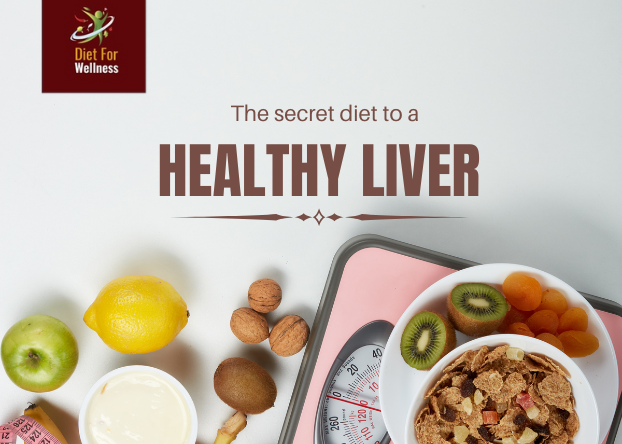The secret diet to a healthy liver

Your liver, a true workhorse, is responsible for a wide range of bodily functions. From producing essential substances like proteins, cholesterol, and bile to storing vital nutrients, it does it all. It also acts as your body’s detoxifier, breaking down harmful toxins like alcohol, medications, and metabolic waste products. Keeping your liver healthy is key to maintaining optimal health.
Just like any other organ, your liver survives on proper nutrition. Consuming a balanced diet rich in specific nutrients can significantly support its vital functions. To understand why certain nutrients are beneficial for liver health, it’s important to recognize the factors that can lead to liver damage.
Recognizing the Signs of Liver Trouble
Early signs of liver damage often go unnoticed, manifesting as subtle symptoms like fatigue, nausea, loss of appetite, jaundice (yellowing of the skin and eyes), and itching. As the disease progresses, more severe symptoms may emerge, including abdominal swelling, easy bruising, vomiting blood, and cognitive impairment due to toxin buildup.
When the liver sustains damage, it can develop fibrosis, a condition characterized by scarring. This scarring can occur due to various factors, such as excessive alcohol consumption or exposure to harmful substances. A damaged liver struggles to regenerate, leading to further complications.
It’s essential to seek medical attention promptly if you suspect liver problems, as many liver diseases often remain asymptomatic until significant damage has occurred.
Food Items That Can Heal Your Liver
Coffee- A Boon for Liver Health

Coffee has emerged as a surprising ally in the battle for liver health. Numerous studies have demonstrated its potential to protect the liver from a range of diseases.
Key Benefits of Coffee for Liver Health
- Reduced Risk of Cirrhosis– Regular coffee consumption has been linked to a lower risk of developing cirrhosis, a severe liver condition characterized by scarring.
- Lowered Liver Cancer Risk– Coffee may help reduce the risk of hepatocellular carcinoma, a common type of liver cancer.
- Improved Liver Function– It can positively impact liver function and reduce inflammation.
- Increased Antioxidant Levels– Coffee boosts levels of glutathione, a potent antioxidant that neutralizes harmful free radicals.
How Does Coffee Work its Magic?
Coffee’s protective effects are believed to stem from its ability to
- Prevent Fat and Collagen Buildup– Coffee can help inhibit the accumulation of fat and collagen, two key markers of liver disease.
- Enhance Antioxidant Defense– By increasing glutathione levels, coffee strengthens the body’s antioxidant defenses.
While moderate coffee consumption is generally beneficial, it’s important to note that excessive intake may have adverse effects. Most studies suggest that drinking at least 3 cups of coffee daily can yield significant health benefits.
As always, it’s advisable to consult with a healthcare professional to determine the optimal coffee intake for your individual needs.
Grapefruit- A Natural Liver Protector

Grapefruit, a citrus fruit packed with antioxidants, offers natural protection for your liver. Two primary antioxidants found in grapefruit, naringenin and naringin, play a crucial role in safeguarding liver health.
How Grapefruit Protects Your Liver
- Reducing Inflammation– Grapefruit’s antioxidants help reduce inflammation in the liver, a major factor contributing to liver damage.
- Protecting Liver Cells- These antioxidants shield liver cells from oxidative stress, preventing cellular damage.
- Inhibiting Fibrosis– Studies suggest that grapefruit antioxidants may help inhibit the development of hepatic fibrosis, a condition characterized by excessive scar tissue in the liver.
While the potential benefits of grapefruit for liver health are promising, it’s important to note that most research has been conducted on animal models. Further human studies are needed to fully understand the effects of grapefruit and its components on liver health.
You incorporate grapefruit into your diet by consuming it fresh or having it in the form of juice. However, it’s essential to be mindful of potential drug interactions, as grapefruit can interfere with the metabolism of certain medications. Always consult with a healthcare professional before making significant changes to your diet, especially if you’re taking any medications.
Cruciferous Vegetables- A Liver-Friendly Food Group

Cruciferous vegetables, renowned for their robust flavor and high fiber content, are also packed with beneficial plant compounds. These versatile vegetables, including broccoli, Brussels sprouts, cabbage, kale, and cauliflower, offer numerous health benefits, particularly for liver health.
How Cruciferous Vegetables Support Liver Health
- Enhanced Detoxification– Certain compounds found in these vegetables can optimize the body’s detoxification processes, helping to eliminate harmful substances.
- Protection Against Liver Damage- Studies have shown that cruciferous vegetables may protect the liver from damage caused by harmful compounds.
- Reduced Risk of Liver Disease– Animal studies, such as a 2016 study, have indicated that consuming cruciferous vegetables, like broccoli, can reduce the risk of liver diseases such as fatty liver disease and cancer.
While human studies are ongoing, the promising results from animal research suggest that incorporating cruciferous vegetables into a balanced diet may contribute to liver health.
Healthy Fats- A Nourishment For Your Liver

To promote liver health, it’s essential to fuel your body with the right kind of fats. Incorporating foods rich in monounsaturated and polyunsaturated fats into your diet can significantly benefit your liver.
Healthy Fat Sources for Liver Health
- Avocados- These are rich in heart-healthy monounsaturated fats.
- Nuts and Seeds- Almonds, walnuts, chia seeds, and flaxseeds are excellent sources of omega-3 fatty acids and other beneficial nutrients.
- Olive Oil- This versatile oil is a staple in Mediterranean diets and is known for its heart-healthy properties.
- Fatty Fish– Salmon, mackerel, and trout are rich in omega-3 fatty acids, which can help reduce inflammation and improve liver function.
Limit Harmful Fats
To maintain optimal liver health, it’s crucial to limit your intake of
- Saturated Fats– Found in red meat, full-fat dairy products, and processed foods, saturated fats can contribute to liver inflammation and disease.
- Trans Fats– These unhealthy fats, often found in processed foods and fried foods, can negatively impact heart health and liver function.
Lifestyle Choices and Support for Liver Health
While a nutritious diet is essential for liver health, lifestyle choices play a crucial role in maintaining liver well-being.
To optimize liver function, consider the following
- Alcohol Consumption- Excessive alcohol consumption is a leading cause of liver damage. If you struggle with alcohol use, seek help from healthcare professionals or support groups.
- Medication Use- Be mindful of medication use and consult with a healthcare provider to avoid potential liver toxicity.
- Balanced Diet– Include fruits, vegetables, as well as whole grains in you diet to support liver health.
- Regular Exercise- Physical activity will ensure that you maintain a healthy weight and your liver function improves.
- Weight Management– Maintaining a healthy weight can reduce the risk of fatty liver disease.
- Hydration– Drinking sufficient water helps flush out toxins.
